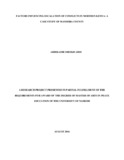| dc.contributor.author | Abdi, A. S. | |
| dc.date.accessioned | 2016-11-15T07:24:54Z | |
| dc.date.available | 2016-11-15T07:24:54Z | |
| dc.date.issued | 2016-08 | |
| dc.identifier.uri | http://hdl.handle.net/11295/97216 | |
| dc.description.abstract | Over the last decade, the Garre and the Murulle have engaged in frequent fights that have affected more other groups in Mandera County. The inter-clan conflict has affected decisions in the County has had long-term implications. The two clans have their own specific rights of why they fight hence deserve attention in the scholarship observation, not only in terms of lacking development but also in terms of the frontier effect. The main purpose of this study was to determine the factors that influence the escalation of conflict in Northern Kenya in Mandera County with a special focus on the Murrule and Garre conflicts. The study was guided by the following specific objectives: establish the influence of political orientation; economic factors; cultural factors; social factors; the influence of the proliferation of small arms and environmental scarce resources on the escalation of conflicts in Mandera County. The study focused on the whole of Mandera County. The target population was 2000 community members, County leader and religious leader who were residents of Mandera County. The sample size of this research was two hundred (200) respondents out of the total population of 2000 community of Mandera County. The sample size was drawn from the target population based on the principle of 10% rule. Data that was collected was obtained from primary sources. Primary data was collected through questionnaires. Focused group discussions were held to elicit information from County leader and religious leader. The 3 groups of 10 participants per group were guided by a moderator who introduced the topics for discussion and help the groups to participate in a lively and natural discussion amongst them. The study adopted a descriptive research design. Quantitative and qualitative data was collected from the field. Quantitative data was analyzed using SPSS version 21.0. Qualitative data was categorized into themes basing on research objectives. The quantitative data were presented in percentages and frequencies in the form of charts and graphs for interpretation and clarity of meaning. Ethical issues were considered when conducting this research. The findings demonstrated that the factors influencing escalation of conflicts in Northern Kenya using a case study of Mandera County were political orientation; economic factors; cultural factors; social factors; the proliferation of small arms and environmental scarce resources on the escalation of conflicts in Mandera County. The study recommended that the involvement of all actors be involved in the peace and reconciliation team. The actors should include local leaders who are the elders; County and National government interventions; youth and women in Mandera County. This inclusivity is important in underlying issues affecting the community members at their capacity and implementation of the recommendations made at barazas | en_US |
| dc.language.iso | en | en_US |
| dc.publisher | University of Nairobi | en_US |
| dc.rights | Attribution-NonCommercial-NoDerivs 3.0 United States | * |
| dc.rights.uri | http://creativecommons.org/licenses/by-nc-nd/3.0/us/ | * |
| dc.subject | Factors Infuencing Escalation Of Conflicts In Northen Kenya: A Case Study Of Mandera County | en_US |
| dc.title | Factors Infuencing Escalation Of Conflicts In Northen Kenya: A Case Study Of Mandera County | en_US |
| dc.type | Thesis | en_US |



